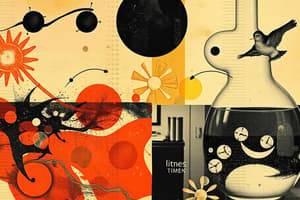Podcast
Questions and Answers
What is matter?
What is matter?
- A substance that has mass but no volume
- A substance that cannot occupy space
- A substance that occupies space and has mass (correct)
- A substance that has volume but no mass
Which state of matter has particles that are tightly packed and retain their shape?
Which state of matter has particles that are tightly packed and retain their shape?
- Plasmas
- Gases
- Solids (correct)
- Liquids
What defines gases?
What defines gases?
- Having a defined shape and defined volume
- Particles packed loosely with no defined shape or volume (correct)
- Molecules that cannot move freely except to vibrate
- Being highly charged particles with high kinetic energy
What is an example of a plasma?
What is an example of a plasma?
Which state of matter maintains its volume but takes the shape of its container?
Which state of matter maintains its volume but takes the shape of its container?
When was Bose-Einstein Condensate (BEC) first created artificially?
When was Bose-Einstein Condensate (BEC) first created artificially?
Study Notes
Matter
Matter is the substance that occupies space and has mass. It can exist in various states such as solid, liquid, gas, plasma, and Bose-Einstein condensate (BEC). The behavior of matter depends on its state and interactions with other matter and energy.
Solids
Solids are made of tightly packed particles that retain their shape and have a fixed volume. They maintain their size and shape without a container, and their molecules cannot move freely except to vibrate. Examples of solids include metals, minerals, and most non-living organic material.
Liquids
Liquids are made of more loosely packed particles that take the shape of their container but maintain constant volume. Particles can move about within a liquid, but they are packed densely enough that volume is maintained. Examples of liquids include water, oil, and alcohol.
Gases
Gases are composed of particles packed so loosely that they have neither a defined shape nor a defined volume. Gases can be compressed by reducing the size of the container, which then reduces the space between particles. Examples of gases include air, carbon dioxide, and oxygen.
Plasmas
Plasmas are highly charged particles with high kinetic energy. They are typically gases that are ionized at high temperatures. Examples of plasmas include stars and fluorescent lights.
Bose-Einstein Condensates (BEC)
BEC was first predicted in the 1920s but created artificially in 1995. BEC occurs at super-low temperatures where molecular motion almost stops, and atoms start to clump together, forming one super atom. It has applications in studying the properties of superfluids, simulating and understanding the conditions that exist in the universe's black holes, and studying the particle/wave paradox.
Matter can experience physical and chemical changes. Physical changes involve changes in properties without breaking or forming bonds, such as changes of state (solid to liquid or gas and vice versa), separation of mixtures, physical deformation, and making solutions. Chemical changes, on the other hand, involve the formation or breaking of chemical bonds, which result in new substances with different properties, such as the formation of precipitates and color changes.
Studying That Suits You
Use AI to generate personalized quizzes and flashcards to suit your learning preferences.
Description
Explore the different states of matter - solids, liquids, gases, plasmas, and Bose-Einstein condensates (BEC) - and their unique properties. Learn about physical and chemical changes that matter can undergo, from changes of state to the formation of new substances.




